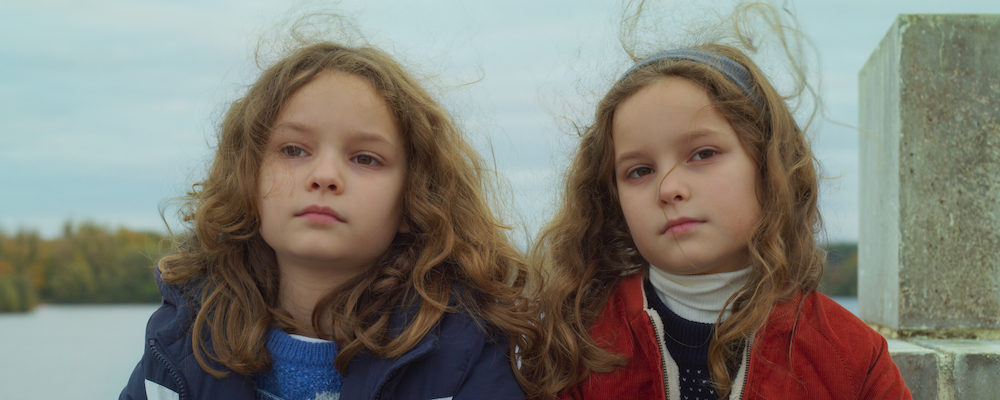Céline Sciamma’s ‘Petite Maman’ Is Hauntingly Hopeful and Perilously Poignant
Tony Sokol
French filmmaker Céline Sciamma is as mischievously playful as an eight-year-old child. The writer-director knows everyone coming into “Petite Maman” is expecting a different kind of horror movie, so she tosses false clues like breadcrumbs leading to the safety of the woods. Early in the film, eight-year-old Nelly (Joséphine Sanz) and her mother Marion (Nina Meurisse) are sitting on a bed after turning off the lights for sleep. They are waiting for their eyes to adjust to the dark so they can see a black panther which appears in the dead of night. It is not a frightening scene, but it is a foreshadowing. There are no ferocious felines in the woods, but something far more haunting: a film for children of all ages.
“Petite Maman” is not a children’s film, but it belongs to the twin leads. Joséphine and Gabrielle Sanz were born for the roles of grieving granddaughter and friendly ghost. They get lost in play in the midst of performance and still manage to find subtle forebodings in a fright-free horror film. Their concerns are very real, however, and when their true relationship is finally revealed, neither they nor the audience question it for one moment. Just like there is no doubt the positive reinforcement which comes from the child-actors play-acting parts in a script are commonplace in the Sanz house.
Nelly’s grandmother (Margot Abascal) died from long-term complications of a hereditary bone disorder, which her mother Marion avoided with the same operation coming in three days to the new friend from the woods. Nelly takes her grandmother’s cane as a memento, but it is also a teleporter. Nelly goes from room to room to say goodbye to the elderly residents in the nursing home where her grandmother died, but never had a chance to say it properly to her grandmother. Fretting over her last goodbye, Nelly ventures into the woods to find a child her own age, with her mother’s name, on a different path in the small forest. The girl lives in an exact replica of Nelly’s grandmother’s house, right down to her grandmother still living there. Young Marion’s circumstances mirror Nelly’s to disconcerting degrees, but the vaguely sinister atmosphere is sugar coated. The ghost even likes to make islands out of her cocoa before eating it, making the audience question which of the two is the apparition.
“Petite Maman” is short, at an hour and 12 minutes, but very sweet, and incredibly moving. It exchanges a grim fairytale for compassionate wishful fulfillment. Almost any eight-year-old can recall imagining what it would be like to play games with their parents at the same age. Grown children of any age want to hear some version of a parental admission similar to “you didn’t invent my sadness.” The most terrifying aspect of the movie is how profound it feels as it skirts the irreconcilable realities it presents. There is one line, a beautiful one really, which blurs the film from ghost story to time-traveling science fiction. What does young Marion hear when she listens to Nelly’s “music of the future?”
The mystery behind the story is more subliminally offset by Nelly’s dad (Stéphane Varupenne), who may not remember the hut in the woods, but has direct exchanges with the girl who shouldn’t quite make sense in a time warp. “I come from the path behind you,” Nelly explains, and cinematographer Claire Mathon lights the way in natural wonder. “You don’t forget,” Nelly admonishes her perennially distracted father, “you just don’t listen.” The film pays complete attention. The cameras capture the small moments, infusing everyday pastimes with life-changing reminders to make each moment count. Soft focus turns the tree fort subtly menacing. A ride on an inflatable boat to a floating concrete pyramid appears to bridge the gap between times.
“Petite maman” means “little mom,” and Nelly conjures a perfect playmate because her mother is forever elsewhere. “You always ask questions at bedtime,” the older Marion says, making yet another excuse for a nighttime exit. “That’s when I see you,” Nelly implores. Sciamma came of age as an indie favorite helming “Water Lilies,” and “Tomboy,” where she also worked with pre-teen actors. Her accidental childhood trilogy concluded with “Girlhood” in 2014 as she toyed with 18th century taboos in the historical drama “Portrait of a Lady on Fire.” “Petite Maman” bridges time with flawless emotional intuition. Nelly and her mom reach across any generational divide to meet as peers, whether flipping pancakes on a sleepover or holding crackers from the backseat for a hands-free, dining-while-driving experience.
“Secrets aren’t always things we try to hide,” Nelly tells her playmate. “There’s just no one to tell them to.” Sciamma doesn’t explain how the magic works, whether it is imagination, reality, or exists in Nelly’s head. Know going in that you will cry coming out, but not in sadness. The conclusion of any time-travel piece is there is never enough time. “I want to sleep to get to tomorrow,” Nelly impatiently internalizes before her final goodbye.
All ghost stories have sorrow at their center. “Petite Maman” is filled with big ideas, done low-key. The child at the center intuits knowing someone hinges on knowing what frightens them most. This is mere subtext to Sciamma who embraces the hope at the center of supernatural encounters.
“Petite Maman” releases April 22 in select theaters.

